Uvi Poznansky's Blog, page 164
June 11, 2015
Still Life with Memories
Lenny appears as a ‘supporting character’ in my novel, Apart From Love, which happens in 1980. His predicament--watching his wife, Natasha, slipping away from him due to her early-onset Alzheimer’s--is heart-rending to me. It fascinates me to such a degree that I find myself compelled to build an entire series surrounding what happens to this family. It will be titled Still Life with Memories. I am writing a new novel as we speak, which gives both Lenny and Natasha center stage, and takes them first to 1970 and then a full generation back, to 1941, to the beginning of their love story. This new volume of the series will be titled The Music of Us.
In 1970, there is only one thing more difficult in Lenny’s mind than talking to his son, who has left home, and that is writing to him. Amazingly, having to conceal what Natasha is going through makes every word—even on subjects unrelated to her condition—that much harder. Lenny finds himself oppressed by his own self-imposed discipline, the discipline of silence.
These are his thoughts:
And what can I tell him, really? That I keep digging into the past, mining its moments, trying to piece them together this way and that, dusting off each memory of Natasha, of how we were, the highs and lows of the music of us, to find out where the problem may have started?
Here is a phone conversation between Lenny and Natasha in 1941, when he was a young soldier and she--a rising star. This is the beginning of their love story. Note not only how chatty she is with him, but also the mechanics of a long distance call through the switchboard:
The Bell phone operator came on. I could hear her fumbling about at the switchboard, which I imagined as a high back panel, consisting of rows of front and back keys, front and back lamps, and cords all about, extending every which way, connecting the entire mess into circuits.At the other end, “Hello,” said Natasha. Her voice sounded intermittent. “She said Hello,” said the operator.“Oh, Hi,” said I.“He said Hi,” said the operator.We laughed. I could barely hear what I thought were giggles, as they were breaking off, coming back on. After a while the connection got better, but at the risk of it deteriorating again, we found ourselves talking rather fast. I asked Natasha if she got my photograph, the one I had sent earlier that month. It showed me amongst others in a group of Marines, all of us dressed in uniforms, looking exactly alike. She said yes, and was I the Marine second from the left, squatting, and in return I should expect a photograph of hers, which I’d better treat with extreme care, not the way I had treated her first envelope, which meant placing it in a dry, safe place, preferably close to my heart, because this is the earliest picture she had with her papa, so it was dear to her, and she’s giving it to me as a special gift, and on an entirely different note, what would I say if she told me that this summer she plans to take some time off from performances, which would give us an opportunity to meet, and even if her Mama would object to this idea, because she protects her only daughter from dates with soldiers in general, because in her opinion they’re good-for-nothing low-lives who sleep who-knows-where with God-knows-who, she, Natasha, would love to see me if, and that’s a big if, I could arrange a visit.
Compare this with another phone conversation between them, 40 years later, described by their son in my novel Apart From Love. Here Lenny calls Natasha, who can no longer understand him, let alone respond, because by now she is afflicted with the disease.
Stopping for a moment by the console table he dials, listens, and redials. His ear is pressed to the handset, which is connected by a long, spiral cord to the phone, which is nearly buried by various papers, and hidden behind an old alarm clock. The cord is stretching tensely in midair, or slithering behind his back as he goes back to hobbling to and fro across the floor. There he goes, reaching the wall, banging it accidentally with the bottom of the crutch and then, somehow, turning around, aiming to reach the opposite wall and bang, turning around again, while listening intently to the earphone. With each footfall, my father attempts to cut through some stutter. He tries, it seems, to restart a conversation. He pays no attention to me. Still, his voice is deliberately lowered, which tells me this is private. I should turn away, really, and keep myself far out of earshot—but for some reason I make no move, and no sound either. Why is the connection so bad, I wonder, and who is it, who could it be at the other end of the line?My father swallows his breath several times, his face turning pale, his eyes—miserable, until finally he bursts out shouting, “Listen, it’s Lenny! Can you hear me, dear? In God’s name, Natasha, it’s me—”
Perhaps you have figured out by now why I call the series Still Life with Memories. Think about the haircut style of a soldier in this era, the woman’s fashion in hats and dresses, The design of cars, the gadgets (such as here, the telephone), the furniture, the stamps and envelopes--these are the details that give a solid background to the story and allow it to harken back to an earlier era in history.
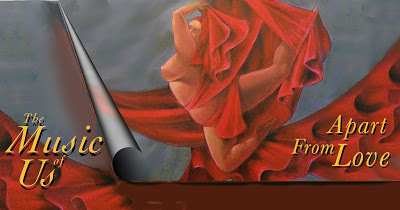
★ Love reading? Get this book ★Apart From LoveEbook: Kindle ★ Nook ★ Apple ★ Kobo ★ Smashwords
Paperback: Amazon ★ Barnes&NobleAudiobook: iTunes ★ Amazon ★ Audible
“Liberally salted with buttery smooth prose & fascinating insights”
In 1970, there is only one thing more difficult in Lenny’s mind than talking to his son, who has left home, and that is writing to him. Amazingly, having to conceal what Natasha is going through makes every word—even on subjects unrelated to her condition—that much harder. Lenny finds himself oppressed by his own self-imposed discipline, the discipline of silence.
These are his thoughts:
And what can I tell him, really? That I keep digging into the past, mining its moments, trying to piece them together this way and that, dusting off each memory of Natasha, of how we were, the highs and lows of the music of us, to find out where the problem may have started?
Here is a phone conversation between Lenny and Natasha in 1941, when he was a young soldier and she--a rising star. This is the beginning of their love story. Note not only how chatty she is with him, but also the mechanics of a long distance call through the switchboard:
The Bell phone operator came on. I could hear her fumbling about at the switchboard, which I imagined as a high back panel, consisting of rows of front and back keys, front and back lamps, and cords all about, extending every which way, connecting the entire mess into circuits.At the other end, “Hello,” said Natasha. Her voice sounded intermittent. “She said Hello,” said the operator.“Oh, Hi,” said I.“He said Hi,” said the operator.We laughed. I could barely hear what I thought were giggles, as they were breaking off, coming back on. After a while the connection got better, but at the risk of it deteriorating again, we found ourselves talking rather fast. I asked Natasha if she got my photograph, the one I had sent earlier that month. It showed me amongst others in a group of Marines, all of us dressed in uniforms, looking exactly alike. She said yes, and was I the Marine second from the left, squatting, and in return I should expect a photograph of hers, which I’d better treat with extreme care, not the way I had treated her first envelope, which meant placing it in a dry, safe place, preferably close to my heart, because this is the earliest picture she had with her papa, so it was dear to her, and she’s giving it to me as a special gift, and on an entirely different note, what would I say if she told me that this summer she plans to take some time off from performances, which would give us an opportunity to meet, and even if her Mama would object to this idea, because she protects her only daughter from dates with soldiers in general, because in her opinion they’re good-for-nothing low-lives who sleep who-knows-where with God-knows-who, she, Natasha, would love to see me if, and that’s a big if, I could arrange a visit.
Compare this with another phone conversation between them, 40 years later, described by their son in my novel Apart From Love. Here Lenny calls Natasha, who can no longer understand him, let alone respond, because by now she is afflicted with the disease.
Stopping for a moment by the console table he dials, listens, and redials. His ear is pressed to the handset, which is connected by a long, spiral cord to the phone, which is nearly buried by various papers, and hidden behind an old alarm clock. The cord is stretching tensely in midair, or slithering behind his back as he goes back to hobbling to and fro across the floor. There he goes, reaching the wall, banging it accidentally with the bottom of the crutch and then, somehow, turning around, aiming to reach the opposite wall and bang, turning around again, while listening intently to the earphone. With each footfall, my father attempts to cut through some stutter. He tries, it seems, to restart a conversation. He pays no attention to me. Still, his voice is deliberately lowered, which tells me this is private. I should turn away, really, and keep myself far out of earshot—but for some reason I make no move, and no sound either. Why is the connection so bad, I wonder, and who is it, who could it be at the other end of the line?My father swallows his breath several times, his face turning pale, his eyes—miserable, until finally he bursts out shouting, “Listen, it’s Lenny! Can you hear me, dear? In God’s name, Natasha, it’s me—”
Perhaps you have figured out by now why I call the series Still Life with Memories. Think about the haircut style of a soldier in this era, the woman’s fashion in hats and dresses, The design of cars, the gadgets (such as here, the telephone), the furniture, the stamps and envelopes--these are the details that give a solid background to the story and allow it to harken back to an earlier era in history.

★ Love reading? Get this book ★Apart From LoveEbook: Kindle ★ Nook ★ Apple ★ Kobo ★ Smashwords
Paperback: Amazon ★ Barnes&NobleAudiobook: iTunes ★ Amazon ★ Audible
“Liberally salted with buttery smooth prose & fascinating insights”
Published on June 11, 2015 06:31
June 9, 2015
Begin the journey, see where it takes you
The David Chronicles is the journey of a lifetime, from the hero's youth to his old age. The way I wrote it is greatly inspired by painting and sculpture throughout the history of art, depicting the story David, who is an exceptional historical figure with great gifts, facing great temptations in love and war. You can easily read each one of the three volumes as a standalone novel, yet the themes of power and love run through the entire trilogy, allowing you to witness the drastic change in the main character from youth to old age. I find this transformation fascinating and hope you will too.
As an artist and writer, I believe that my mission is to let the characters speak to you through me. David is flesh and blood, he lives in my mind, and so does Bathsheba. This story is happening here and now. I invite you to step into the skin of the characters, and look yourself in the mirror.
Here is the first time David lays eyes on Bathsheba in volume I of the trilogy, Rise to Power:
Then, on a whim, she plunges underwater nearly all the way, so all that remains above the foamy surface is the little embroidered towel wrapped around her head. After several evenings of watching her from afar I still have no idea if her hair is curled or straight, red or brown. I have painted her in my mind several different ways already, each time more beautiful than the other. By now it matters little to me. She is so sexy, she might as well be bald. When she comes back up, “What,” she says. “You still here?”“What’s the point of going up there,” I say, hearing a slight tone of complaint in my voice. I hope she does not think me childish. That would be devastating. With a hint of a smile, she asks, “What does that mean, What’s the point?”So I say, “You would seem too small from above.”“Really,” says Bathsheba. “I thought I spotted you standing by your window, with your sword aimed at me.”To which I explain, “I could not see a thing through the glass. It became cloudy, or something. At this time of day, even though it is only the beginning of summer, it’s much too steamy in the office.”She rolls her eyes. “I’ve had it with men.”I can find nothing to say, and perhaps there is no need to. She can tell, can’t she, how desperately I ache for her.“My life is scandal-free at the moment,” she says. “It feels nice for a change.”
David’s love affair with Bathsheba is, arguably, the most torrid love affair ever told, and the love scenes could not be less than arousing, yet they must be delivered with lyricism and be no more explicit than the biblical Song of Songs. Here, then, is an excerpt from A Peek at Bathsheba:
Separated from her by the thought of a kiss I sense her heat, and the gust of air scented by roses and by her flesh—but I cannot tell if the breath between us is hers or mine. Which is when I know, for one perfect moment, that she is part of my essence. I am part of hers.Bathsheba holds me in a tender embrace as I lay her down. Scattered petals fly off, swirling in the air around her long, silky hair that starts cascading here, over the pillows and onto the tile floor. Accidentally the goblet, which she has set down next to her, tips over and some of the wine spills over her hip. I dip a finger in the red puddle beside her, and paint countless grapes around her waist. Intoxicated I murmur to her, “Your graceful legs are like jewels, the work of an artist’s hands. Your navel is a rounded goblet that never lacks blended wine.” I want to wait, wait for her to give herself to me—but in the end I cannot fight my passion any longer, and I take her. She sighs softly and arches herself against me, rising on the fervor of my caress, higher and higher into ecstasy.
Here is the way he thinks of Bathsheba towards the end of his life, in volume 3, The Edge of Revolt:
Overhead, a cloud breaks off from the others and moves in a new direction. Its wooly, dim grays are drifting across. I squint, rub my eyes. Now, in a separate layer, another image starts floating past: the way she looked, right here on this roof, when we came out of these doors the very first time. I remember: scattered petals flew off, swirling in the glow around her long, silky hair that started cascading under her, onto the tile floor. In the background, a vine of roses twisted over the wooden lattice and into it. Between its diagonal slats I saw a diamond here, a diamond there of the heavens. I wondered then about the black void that was gaping upon us, dotted by a magical glint of starlight.Separated from her by the thought of a kiss I sensed her heat, and the gust of air, which was sweetly scented by roses and by her flesh—but I could not tell if the breath between us was hers or mine. Which is when I knew, for the first time in my life, that she would always be part of my essence. I would be part of hers.Accidentally the goblet, which she had set down next to her, tipped over and some of the wine spilled over her hip. The crisp sound of breaking glass rang in my ear. It marked the moment, from which I could not turn back. Never would I be able to put it out of my mind.Yes, this was my fault: taking a woman that belonged to another. Soon after came the blunder: bringing her husband, Uriah, back from the front, that he may sleep with her, which would have explained her pregnancy ever so conveniently. And when that did not go as planned, then came another mistake, the worst of all: sending him back to the battlefield, with my sealed letter in hand, arranging for his death. All the while, my boys were learning their own lessons—not from my psalms but from my deeds. One error begets another, each one bringing a new calamity over me, over my family, and over this entire land. Sin followed by execution, followed by revolt, escape, execution, revolt...Had I known back then the results of the results of my mistake, the curse looming over my life ever since that time, would I still choose to do it? Bathsheba tries to raise me to my feet. Her fragrance brings back to me the sunny, warm hues of spring. The fears, the doubts flee away when we are that close. I adore the way she calls my name, the way she sighs. With every sweet word I fall deeper into her eyes. How can love be a mistake? In my passion for her—then as now—what choice do I have?
I want to tell her, “Let me close my eyes. Let me remember.”

★ Start the journey with Rise to Power ★
Then, get the entire trilogy
Volume I: Rise to PowerEbook: Kindle ★ Nook ★ Apple ★ Kobo ★ SmashwordsPaperback: Amazon ★ Barnes&NobleAudiobook: iTunes ★ Amazon ★ Audible
Volume II:A Peek at BathshebaEbook: Kindle ★ Nook ★ Apple ★ Kobo ★ SmashwordsPaperback: Amazon ★ Barnes&NobleAudiobook: iTunes ★ Amazon ★ Audible
Volume III:The Edge of RevoltEbook: Kindle ★ Nook ★ Apple ★ Kobo ★ SmashwordsPaperback Amazon ★ Barnes&Noble
As an artist and writer, I believe that my mission is to let the characters speak to you through me. David is flesh and blood, he lives in my mind, and so does Bathsheba. This story is happening here and now. I invite you to step into the skin of the characters, and look yourself in the mirror.
Here is the first time David lays eyes on Bathsheba in volume I of the trilogy, Rise to Power:
Then, on a whim, she plunges underwater nearly all the way, so all that remains above the foamy surface is the little embroidered towel wrapped around her head. After several evenings of watching her from afar I still have no idea if her hair is curled or straight, red or brown. I have painted her in my mind several different ways already, each time more beautiful than the other. By now it matters little to me. She is so sexy, she might as well be bald. When she comes back up, “What,” she says. “You still here?”“What’s the point of going up there,” I say, hearing a slight tone of complaint in my voice. I hope she does not think me childish. That would be devastating. With a hint of a smile, she asks, “What does that mean, What’s the point?”So I say, “You would seem too small from above.”“Really,” says Bathsheba. “I thought I spotted you standing by your window, with your sword aimed at me.”To which I explain, “I could not see a thing through the glass. It became cloudy, or something. At this time of day, even though it is only the beginning of summer, it’s much too steamy in the office.”She rolls her eyes. “I’ve had it with men.”I can find nothing to say, and perhaps there is no need to. She can tell, can’t she, how desperately I ache for her.“My life is scandal-free at the moment,” she says. “It feels nice for a change.”
David’s love affair with Bathsheba is, arguably, the most torrid love affair ever told, and the love scenes could not be less than arousing, yet they must be delivered with lyricism and be no more explicit than the biblical Song of Songs. Here, then, is an excerpt from A Peek at Bathsheba:
Separated from her by the thought of a kiss I sense her heat, and the gust of air scented by roses and by her flesh—but I cannot tell if the breath between us is hers or mine. Which is when I know, for one perfect moment, that she is part of my essence. I am part of hers.Bathsheba holds me in a tender embrace as I lay her down. Scattered petals fly off, swirling in the air around her long, silky hair that starts cascading here, over the pillows and onto the tile floor. Accidentally the goblet, which she has set down next to her, tips over and some of the wine spills over her hip. I dip a finger in the red puddle beside her, and paint countless grapes around her waist. Intoxicated I murmur to her, “Your graceful legs are like jewels, the work of an artist’s hands. Your navel is a rounded goblet that never lacks blended wine.” I want to wait, wait for her to give herself to me—but in the end I cannot fight my passion any longer, and I take her. She sighs softly and arches herself against me, rising on the fervor of my caress, higher and higher into ecstasy.
Here is the way he thinks of Bathsheba towards the end of his life, in volume 3, The Edge of Revolt:
Overhead, a cloud breaks off from the others and moves in a new direction. Its wooly, dim grays are drifting across. I squint, rub my eyes. Now, in a separate layer, another image starts floating past: the way she looked, right here on this roof, when we came out of these doors the very first time. I remember: scattered petals flew off, swirling in the glow around her long, silky hair that started cascading under her, onto the tile floor. In the background, a vine of roses twisted over the wooden lattice and into it. Between its diagonal slats I saw a diamond here, a diamond there of the heavens. I wondered then about the black void that was gaping upon us, dotted by a magical glint of starlight.Separated from her by the thought of a kiss I sensed her heat, and the gust of air, which was sweetly scented by roses and by her flesh—but I could not tell if the breath between us was hers or mine. Which is when I knew, for the first time in my life, that she would always be part of my essence. I would be part of hers.Accidentally the goblet, which she had set down next to her, tipped over and some of the wine spilled over her hip. The crisp sound of breaking glass rang in my ear. It marked the moment, from which I could not turn back. Never would I be able to put it out of my mind.Yes, this was my fault: taking a woman that belonged to another. Soon after came the blunder: bringing her husband, Uriah, back from the front, that he may sleep with her, which would have explained her pregnancy ever so conveniently. And when that did not go as planned, then came another mistake, the worst of all: sending him back to the battlefield, with my sealed letter in hand, arranging for his death. All the while, my boys were learning their own lessons—not from my psalms but from my deeds. One error begets another, each one bringing a new calamity over me, over my family, and over this entire land. Sin followed by execution, followed by revolt, escape, execution, revolt...Had I known back then the results of the results of my mistake, the curse looming over my life ever since that time, would I still choose to do it? Bathsheba tries to raise me to my feet. Her fragrance brings back to me the sunny, warm hues of spring. The fears, the doubts flee away when we are that close. I adore the way she calls my name, the way she sighs. With every sweet word I fall deeper into her eyes. How can love be a mistake? In my passion for her—then as now—what choice do I have?
I want to tell her, “Let me close my eyes. Let me remember.”

★ Start the journey with Rise to Power ★
Then, get the entire trilogy
Volume I: Rise to PowerEbook: Kindle ★ Nook ★ Apple ★ Kobo ★ SmashwordsPaperback: Amazon ★ Barnes&NobleAudiobook: iTunes ★ Amazon ★ Audible
Volume II:A Peek at BathshebaEbook: Kindle ★ Nook ★ Apple ★ Kobo ★ SmashwordsPaperback: Amazon ★ Barnes&NobleAudiobook: iTunes ★ Amazon ★ Audible
Volume III:The Edge of RevoltEbook: Kindle ★ Nook ★ Apple ★ Kobo ★ SmashwordsPaperback Amazon ★ Barnes&Noble
Published on June 09, 2015 21:08
June 8, 2015
"Rise to Power" waxes Shakespearean
Michael James Gallagher is an established author who began his writing journey with a gripping, post-cold-war espionage thriller: Tsunami Connection. I am thrilled to find his review for my novel Rise to Power:
5 A Truly Jewish StoryByAmazon Customer "Michael James Gallagher"on June 6, 2015Format: Kindle Edition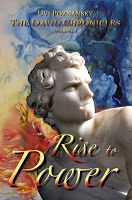 Uvi Poznansky's "Rise to Power" waxes Shakespearean: "What a rogue and peasant slave..." is Saul and yet bursts out with an intriguing "I Claudius" tone at times as well.. The best of both worlds. Kingly pomp, drenched in battle blood, and stark raving, in-bred madness all painted together in a picture of David as a modern man. Why did choose At Odds with Destiny? Well, I love to get my history indirectly in fictional form and the 12 tribes of Israel have intrigued me since spending almost a year in Israel in my late 20's. I know. I know, that was 35 years ago. Life, work, raising two wonderful children didn't leave time to peruse history for interesting topics. Now I am retired and can take my curiosity wherever it wanders.
Uvi Poznansky's "Rise to Power" waxes Shakespearean: "What a rogue and peasant slave..." is Saul and yet bursts out with an intriguing "I Claudius" tone at times as well.. The best of both worlds. Kingly pomp, drenched in battle blood, and stark raving, in-bred madness all painted together in a picture of David as a modern man. Why did choose At Odds with Destiny? Well, I love to get my history indirectly in fictional form and the 12 tribes of Israel have intrigued me since spending almost a year in Israel in my late 20's. I know. I know, that was 35 years ago. Life, work, raising two wonderful children didn't leave time to peruse history for interesting topics. Now I am retired and can take my curiosity wherever it wanders.
Now back to "Rise to Power". The story opens up with a Hamlet-like Saul suffering and lamenting, among other things, that he doomed his rise to power by showing mercy to a captured king. Almost like another of Shakespeare's characters, Lady Macbeth, he can't wash out the stain of this ill-fated decision. Enter the 'fool', a wise peasant in the person of David the musician trying his luck as court musician. Saul tries to dissuade the young man and sends him packing but he's persistent. So the story of the foundations of the House of David begins. No more spoilers here. Highly recommended. Five stars
5 A Truly Jewish StoryByAmazon Customer "Michael James Gallagher"on June 6, 2015Format: Kindle Edition
 Uvi Poznansky's "Rise to Power" waxes Shakespearean: "What a rogue and peasant slave..." is Saul and yet bursts out with an intriguing "I Claudius" tone at times as well.. The best of both worlds. Kingly pomp, drenched in battle blood, and stark raving, in-bred madness all painted together in a picture of David as a modern man. Why did choose At Odds with Destiny? Well, I love to get my history indirectly in fictional form and the 12 tribes of Israel have intrigued me since spending almost a year in Israel in my late 20's. I know. I know, that was 35 years ago. Life, work, raising two wonderful children didn't leave time to peruse history for interesting topics. Now I am retired and can take my curiosity wherever it wanders.
Uvi Poznansky's "Rise to Power" waxes Shakespearean: "What a rogue and peasant slave..." is Saul and yet bursts out with an intriguing "I Claudius" tone at times as well.. The best of both worlds. Kingly pomp, drenched in battle blood, and stark raving, in-bred madness all painted together in a picture of David as a modern man. Why did choose At Odds with Destiny? Well, I love to get my history indirectly in fictional form and the 12 tribes of Israel have intrigued me since spending almost a year in Israel in my late 20's. I know. I know, that was 35 years ago. Life, work, raising two wonderful children didn't leave time to peruse history for interesting topics. Now I am retired and can take my curiosity wherever it wanders.Now back to "Rise to Power". The story opens up with a Hamlet-like Saul suffering and lamenting, among other things, that he doomed his rise to power by showing mercy to a captured king. Almost like another of Shakespeare's characters, Lady Macbeth, he can't wash out the stain of this ill-fated decision. Enter the 'fool', a wise peasant in the person of David the musician trying his luck as court musician. Saul tries to dissuade the young man and sends him packing but he's persistent. So the story of the foundations of the House of David begins. No more spoilers here. Highly recommended. Five stars
Published on June 08, 2015 18:23
June 4, 2015
Fascinating and entertaining
Short and sweet review for my novel, Rise to Power:
5 five starsByBook Readson June 2, 2015Format: Kindle EditionVerified Purchase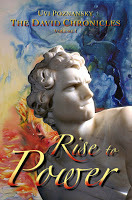 Rise to Power by Uvi Poznansky is a marvelous book! A great read with depth and emotion. It's an interesting twist on historical fiction with a modern flair, fascinating and entertaining. Very well written. This fictional tale uses biblical history as the backdrop. The focus of the book is in portraying David's rise from the shadows to power with the events and people along the way. Filled with action, romance, and humor. it's an enthralling read as you immerse yourself into the story. Looking forward to the next book in the series.
Rise to Power by Uvi Poznansky is a marvelous book! A great read with depth and emotion. It's an interesting twist on historical fiction with a modern flair, fascinating and entertaining. Very well written. This fictional tale uses biblical history as the backdrop. The focus of the book is in portraying David's rise from the shadows to power with the events and people along the way. Filled with action, romance, and humor. it's an enthralling read as you immerse yourself into the story. Looking forward to the next book in the series.
5 five starsByBook Readson June 2, 2015Format: Kindle EditionVerified Purchase
 Rise to Power by Uvi Poznansky is a marvelous book! A great read with depth and emotion. It's an interesting twist on historical fiction with a modern flair, fascinating and entertaining. Very well written. This fictional tale uses biblical history as the backdrop. The focus of the book is in portraying David's rise from the shadows to power with the events and people along the way. Filled with action, romance, and humor. it's an enthralling read as you immerse yourself into the story. Looking forward to the next book in the series.
Rise to Power by Uvi Poznansky is a marvelous book! A great read with depth and emotion. It's an interesting twist on historical fiction with a modern flair, fascinating and entertaining. Very well written. This fictional tale uses biblical history as the backdrop. The focus of the book is in portraying David's rise from the shadows to power with the events and people along the way. Filled with action, romance, and humor. it's an enthralling read as you immerse yourself into the story. Looking forward to the next book in the series.
Published on June 04, 2015 18:33
He plunged them into Absalom’s heart
“Oh, it was terrifying!” cries the soldier. “And yet, Absalom looked more magnificent than ever! He was beginning to look like a tree himself, with his hair pulling at its roots, branching out, twisting every which way in that light, that dim light that slipped here and there through the leaves, dappling him.”Nathan utters a sigh, which is immediately echoed by the soldiers around him. Meanwhile, the soldier goes on to say, “Then I called Joav. I told him, ‘I just saw Absalom hanging in an oak tree.’ And Joav cried out, ‘What! You saw him? Why didn’t you strike him to the ground right there?’”“And? What did you say to that?”“At first, nothing. So he said, ‘Ha! If you had killed him I’d have had to give you ten shekels of silver and a warrior’s belt.’ To which I said, ‘Even if a thousand shekels were weighed out into my hands I wouldn’t lay a hand on the king’s son.’ Joav glanced at me shrewdly, as if to ask, ‘Why not?’ So I responded by asking, ‘Don’t you remember? As we headed out of town for this battle, the king made a point of asking you and everyone else, for his sake, to be gentle with the young man Absalom.’”“Even so, weren’t you tempted?” asks the old scribe. “I mean, it’s not every day that a soldier gets a chance to win ten shekels of silver and a warrior’s belt!”“For that I had to put my life in jeopardy,” says the soldier, “because nothing’s hidden from the king.”“Come now, how would he find out?”“To remove blame from himself, Joav would’ve pointed me out to him. Ignoring the fact that Joav gave me a direct order, he would’ve accused me of slaying Absalom.”“So,” says the scribe, “When Joav saw that you wouldn’t do what he asked of you, what did he do then?”“He shrugged, saying, ‘I’m not going to wait like this for you.’ Then he rode out to the oak tree, from which Absalom was dangling.”“And when he got there, what happened?”
“Joav raised his eyes to the king’s son, who shuddered to see him, and asked, ‘Why should I spare you? Give me one good reason to do so!’ And Absalom said, in a husky voice, pleading for his life, ‘Because we’re family!’ To which Joav said, ‘Ha! I thought so too, until the day you dared touch what’s mine and burn it!’ And he took three javelins in his hand and plunged them into Absalom’s heart while he was still alive in the oak tree.”
Absalon, son of David, was known to be the most handsome man in Israel. Here are two maids chatting about his beautiful hair, his best asset, which in the end caused his demise when he was caught by the hair in an oak tree:
“In all Israel,” says the old maid, “there’s not a man so highly praised for his looks as Absalom.”
“So handsome,” says the young one, with a little chuckle. “Cute, too!”
“From the top of his head to the sole of his foot there’s not a blemish in him.”
“Perfect, is what he is!”
“When his hair gets long, all the king’s wives envy him for it—”
“And so do I! So shiny, so luxurious!”
David in The Edge of Revolt
My three novels about the life and time of David are greatly inspired by art of all ages. This moment in his story is described by several artists. They put us in awe at their depiction of Absalom getting his hair caught in an oak tree, an easy prey for his assassins.
In the first piece, Death of Absalom by Albert Weisgerber, we happen upon Absalom in the uncertain, foggy light, seeping in through the trees of the forrest. At first glance he seems to be dancing like a clown, until we realize that he is falling desperately about, trying to find his footing. In the second piece, Death of Absalom by Julius Schnorr von Carolsfeld, we face the drama head on, and there is little doubt that Absalom is doomed, because of the dramatic clarity of the artist's strokes.
 Death of Absalom by Albert Weisgerber
Death of Absalom by Albert Weisgerber
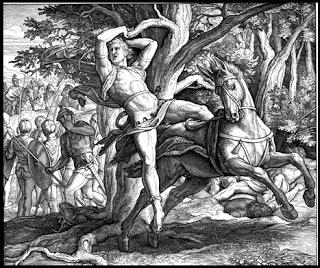 Death of Absalom by Julius Schnorr von Carolsfeld
Death of Absalom by Julius Schnorr von Carolsfeld
The complete trilogy:The David Chronicles (Boxed Set) Ebook: Kindle ★ Apple ★ Nook ★ Kobo ★ Smashwords
Volume I: Rise to PowerEbook: Kindle ★ Nook ★ Apple ★ Kobo ★ SmashwordsPaperback: Amazon ★ Barnes&NobleAudiobook: iTunes ★ Amazon ★ Audible
Volume II:A Peek at BathshebaEbook: Kindle ★ Nook ★ Apple ★ Kobo ★ SmashwordsPaperback: Amazon ★ Barnes&NobleAudiobook: iTunes ★ Amazon ★ Audible
Volume III:The Edge of RevoltEbook: Kindle ★ Nook ★ Apple ★ Kobo ★ SmashwordsPaperback Amazon ★ Barnes&Noble
“Joav raised his eyes to the king’s son, who shuddered to see him, and asked, ‘Why should I spare you? Give me one good reason to do so!’ And Absalom said, in a husky voice, pleading for his life, ‘Because we’re family!’ To which Joav said, ‘Ha! I thought so too, until the day you dared touch what’s mine and burn it!’ And he took three javelins in his hand and plunged them into Absalom’s heart while he was still alive in the oak tree.”
Absalon, son of David, was known to be the most handsome man in Israel. Here are two maids chatting about his beautiful hair, his best asset, which in the end caused his demise when he was caught by the hair in an oak tree:
“In all Israel,” says the old maid, “there’s not a man so highly praised for his looks as Absalom.”
“So handsome,” says the young one, with a little chuckle. “Cute, too!”
“From the top of his head to the sole of his foot there’s not a blemish in him.”
“Perfect, is what he is!”
“When his hair gets long, all the king’s wives envy him for it—”
“And so do I! So shiny, so luxurious!”
David in The Edge of Revolt
My three novels about the life and time of David are greatly inspired by art of all ages. This moment in his story is described by several artists. They put us in awe at their depiction of Absalom getting his hair caught in an oak tree, an easy prey for his assassins.
In the first piece, Death of Absalom by Albert Weisgerber, we happen upon Absalom in the uncertain, foggy light, seeping in through the trees of the forrest. At first glance he seems to be dancing like a clown, until we realize that he is falling desperately about, trying to find his footing. In the second piece, Death of Absalom by Julius Schnorr von Carolsfeld, we face the drama head on, and there is little doubt that Absalom is doomed, because of the dramatic clarity of the artist's strokes.
 Death of Absalom by Albert Weisgerber
Death of Absalom by Albert Weisgerber Death of Absalom by Julius Schnorr von Carolsfeld
Death of Absalom by Julius Schnorr von Carolsfeld The complete trilogy:The David Chronicles (Boxed Set) Ebook: Kindle ★ Apple ★ Nook ★ Kobo ★ Smashwords
Volume I: Rise to PowerEbook: Kindle ★ Nook ★ Apple ★ Kobo ★ SmashwordsPaperback: Amazon ★ Barnes&NobleAudiobook: iTunes ★ Amazon ★ Audible
Volume II:A Peek at BathshebaEbook: Kindle ★ Nook ★ Apple ★ Kobo ★ SmashwordsPaperback: Amazon ★ Barnes&NobleAudiobook: iTunes ★ Amazon ★ Audible
Volume III:The Edge of RevoltEbook: Kindle ★ Nook ★ Apple ★ Kobo ★ SmashwordsPaperback Amazon ★ Barnes&Noble
Published on June 04, 2015 06:58
May 31, 2015
Chuckled in guilty understanding and laughed out loud
Wanda "Panda" Hartzenberg is a top rated reviewer, and the author of The Struggle of Me. She is also a high-ranking reviewer on Goodreads. So I am deeply honored that she posted this review for my novel, Rise to Power:
5 Ahm. Oh my. David is far more interesting now!ByWanda "Wandah Panda"on May 31, 2015Format: Kindle EditionVerified Purchase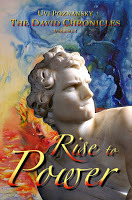 Until yesterday I was convinced I have read and reviewed this book before.
Until yesterday I was convinced I have read and reviewed this book before.
I started it and finished it in one sitting. The prose are truly like poetry in motion.
Not at all the David I came to know from the Bible and at the same time exactly like the man that fathered nations and religions.
I gasped in shock. Chuckled in guilty understanding and laughed out loud at life from the point of view of David. Not so much a hero here, much more a man. But then, hero's are created post life and this David is very much alive.
5 Ahm. Oh my. David is far more interesting now!ByWanda "Wandah Panda"on May 31, 2015Format: Kindle EditionVerified Purchase
 Until yesterday I was convinced I have read and reviewed this book before.
Until yesterday I was convinced I have read and reviewed this book before.I started it and finished it in one sitting. The prose are truly like poetry in motion.
Not at all the David I came to know from the Bible and at the same time exactly like the man that fathered nations and religions.
I gasped in shock. Chuckled in guilty understanding and laughed out loud at life from the point of view of David. Not so much a hero here, much more a man. But then, hero's are created post life and this David is very much alive.
Published on May 31, 2015 18:39
Imaginatively sculpted with words
Here is a short a sweet review by Lori Lopez, the author of many books of lovely quirky writing, for my book, Twisted:
Artistic!, May 29, 2015By Lori Lopez "Wordsmith"Verified Purchase(What's this?)This review is from: Twisted (Kindle Edition)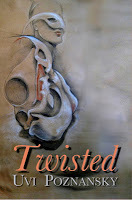 This is a very short yet intriguing collection loosely bound by a common theme. All of the tales are imaginatively sculpted with words by the author-artist, and there is a sense of the characters taking shape, struggling through various trials in a three-dimensional manner. I found it unusual and captivating.
This is a very short yet intriguing collection loosely bound by a common theme. All of the tales are imaginatively sculpted with words by the author-artist, and there is a sense of the characters taking shape, struggling through various trials in a three-dimensional manner. I found it unusual and captivating.
Artistic!, May 29, 2015By Lori Lopez "Wordsmith"Verified Purchase(What's this?)This review is from: Twisted (Kindle Edition)
 This is a very short yet intriguing collection loosely bound by a common theme. All of the tales are imaginatively sculpted with words by the author-artist, and there is a sense of the characters taking shape, struggling through various trials in a three-dimensional manner. I found it unusual and captivating.
This is a very short yet intriguing collection loosely bound by a common theme. All of the tales are imaginatively sculpted with words by the author-artist, and there is a sense of the characters taking shape, struggling through various trials in a three-dimensional manner. I found it unusual and captivating.
Published on May 31, 2015 09:10
May 29, 2015
If only I had died instead of you!
Meanwhile, the second runner arrives, a dark skinned young men with an Egyptian accent. “My lord the king,” the Cushite calls out, “hear me, hear the good news! The Lord has vindicated you today by delivering you from the hand of all who rose up against you.”To his surprise, and mine as well, I care nothing about how the battle developed, and how victory was achieved. Instead, all I want to know is one thing, and one thing only. “Is the young man Absalom safe?”The Cushite raises his hand, and with a cruel glint in his eye and a slicing gesture across his throat, he starts laughing. Perhaps he hopes to sweep me into his bloodthirsty joy. I cover my eyes so as not to see him, but I cannot stop myself from hearing his voice, saying, “May the enemies of my lord the king and all who rise up to harm you be like that young man.”At that, I am badly shaken. I go up to the room over the gateway and close the door behind me, and clap a hand over my mouth, clap it tightly to stop myself from uttering these gruff sounds, these sobs. This is not the first time I find myself in the presence of death. I mourned for friends and for enemies, and managed to shape my feelings into the most eloquent eulogies, articulating the meaning of grief for large audiences. I knew they needed to wash themselves of sorrow, by devoting a moment to remember the departed, and vow to keep him in their thoughts forever, before allowing him to be forgotten. I used to enjoy expressing myself, even in sadness. Yet now, the only cries that come bursting out of me are so violent, so forceful, that they are nearly devoid of language. “Oh my son Absalom! My son, my son Absalom!”I thrust my crown across the floor till it clangs, clangs, clangs. And to that sound I collapse into the corner, and press my lips like a lover against the stone wall, letting its coldness seep into me.“If only I had died instead of you! Oh Absalom, my son, my son!”
❋
I have no idea how much time has passed since I closed myself in this place. From time to time the door starts screeching on its hinges, as someone comes in. He brings in food, which I know because the plate rattles against the surface of the floor, before his footfalls fade away. Whoever he is I grant him nothing, not even as much as a glance, and I leave the food untouched.Yet even as I want to be left alone, I find myself dreading my loneliness.
My heart pounds, my strength fails me. Even the light has gone from my eyes. My friends and companions avoid me because of my wounds.
My neighbors stay far away.
David in The Edge of Revolt
My novel is greatly inspired by art of all ages, and here you can see two of the art pieces that depict the moment of Absalom's death, in two very different perspectives. The first piece, a beautiful etching by the French artist Gustave Doré, the moment is depicted with a great, dramatic thrust. You can see only a silhouette of the victim, hanging by his hair from the tree, still alive, still twitching, until the attackers (in the foreground) will arrive to pierce his heart.
The second piece, done in green silk with foil-wrapped threads, is deceptively, eerily quiet, with a beautiful landscape encompassing it all. The victim is in the center, the attacker at the right, but the real drama happens in the heart of the king, who is waiting at the very top for news, to hear if his son is still alive.
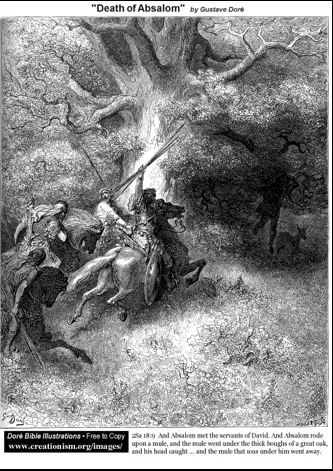

The complete trilogy:The David Chronicles (Boxed Set) Ebook: Kindle ★ Apple ★ Nook ★ Kobo ★ Smashwords
Volume I: Rise to PowerEbook: Kindle ★ Nook ★ Apple ★ Kobo ★ SmashwordsPaperback: Amazon ★ Barnes&NobleAudiobook: iTunes ★ Amazon ★ Audible
Volume II:A Peek at BathshebaEbook: Kindle ★ Nook ★ Apple ★ Kobo ★ SmashwordsPaperback: Amazon ★ Barnes&NobleAudiobook: iTunes ★ Amazon ★ Audible
Volume III:The Edge of RevoltEbook: Kindle ★ Nook ★ Apple ★ Kobo ★ SmashwordsPaperback Amazon ★ Barnes&Noble
❋
I have no idea how much time has passed since I closed myself in this place. From time to time the door starts screeching on its hinges, as someone comes in. He brings in food, which I know because the plate rattles against the surface of the floor, before his footfalls fade away. Whoever he is I grant him nothing, not even as much as a glance, and I leave the food untouched.Yet even as I want to be left alone, I find myself dreading my loneliness.
My heart pounds, my strength fails me. Even the light has gone from my eyes. My friends and companions avoid me because of my wounds.
My neighbors stay far away.
David in The Edge of Revolt
My novel is greatly inspired by art of all ages, and here you can see two of the art pieces that depict the moment of Absalom's death, in two very different perspectives. The first piece, a beautiful etching by the French artist Gustave Doré, the moment is depicted with a great, dramatic thrust. You can see only a silhouette of the victim, hanging by his hair from the tree, still alive, still twitching, until the attackers (in the foreground) will arrive to pierce his heart.
The second piece, done in green silk with foil-wrapped threads, is deceptively, eerily quiet, with a beautiful landscape encompassing it all. The victim is in the center, the attacker at the right, but the real drama happens in the heart of the king, who is waiting at the very top for news, to hear if his son is still alive.


The complete trilogy:The David Chronicles (Boxed Set) Ebook: Kindle ★ Apple ★ Nook ★ Kobo ★ Smashwords
Volume I: Rise to PowerEbook: Kindle ★ Nook ★ Apple ★ Kobo ★ SmashwordsPaperback: Amazon ★ Barnes&NobleAudiobook: iTunes ★ Amazon ★ Audible
Volume II:A Peek at BathshebaEbook: Kindle ★ Nook ★ Apple ★ Kobo ★ SmashwordsPaperback: Amazon ★ Barnes&NobleAudiobook: iTunes ★ Amazon ★ Audible
Volume III:The Edge of RevoltEbook: Kindle ★ Nook ★ Apple ★ Kobo ★ SmashwordsPaperback Amazon ★ Barnes&Noble
Published on May 29, 2015 13:31
May 27, 2015
A Great Story
A short and sweet review of A Favorite Son:
5 A great storyByAmazon readeron April 3, 2015Format: Kindle EditionVerified Purchase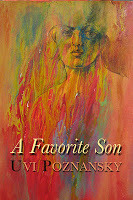 A great story based on ancient scriptures the author takes us to the biblical period and sweeps us a fascinating story, modern contemporary version. Delightful and exciting. I read the book from beginning to end Unable to stop... Warm recommendation
A great story based on ancient scriptures the author takes us to the biblical period and sweeps us a fascinating story, modern contemporary version. Delightful and exciting. I read the book from beginning to end Unable to stop... Warm recommendation
5 A great storyByAmazon readeron April 3, 2015Format: Kindle EditionVerified Purchase
 A great story based on ancient scriptures the author takes us to the biblical period and sweeps us a fascinating story, modern contemporary version. Delightful and exciting. I read the book from beginning to end Unable to stop... Warm recommendation
A great story based on ancient scriptures the author takes us to the biblical period and sweeps us a fascinating story, modern contemporary version. Delightful and exciting. I read the book from beginning to end Unable to stop... Warm recommendation
Published on May 27, 2015 09:34
May 26, 2015
Bathsheba, a soldier's wife
I sit at the edge of the bed, utterly fascinated by her beauty. Her lashes are long, they flutter over her cheeks, and her hair waves around her face with the rhythm of her steps. It glows like copper under the flaming sconces, but when she crosses in front of the window it turns blue against the moonshine. She glances at the collection of crowns, down there in my trunk, and leans in to touch some of them, perhaps to estimate their sizes, and the number of nations, the number of kings I conquered.“Fine pieces,” I say, casually. “You can choose as many of them as you want.”“No,” she says, drawling the word until it turns into a sigh. “I’m bored with it.”“Are you? Bored with jewelry?”By way of an answer she says, “After every battle Uriah brings me a little something, which he chooses for me out of the plunder, hoping I won’t refuse it this time.”“Which you always do,” I say, half-asking.“I have no use for such things.”“Then, what is it you want?”“Who knows,” she says, vaguely.Aroused, this time by curiosity, “You must know,” I say.“But,” she says, teasingly, “I’m not going to tell you. You, of all people, would never understand me.”“Why not?”“Because,” she says, waving a hand at the open trunk, where my treasures are strewn about, and at my bed.“Because what?”“You’ve been blessed. You possess so much that you can’t begin to appreciate your luck. So many things, so many victories, women, children.”With that, she bends over a pile of maps and other scrolls of papyrus. Pushing them aside, Bathsheba fingers the surface of my desk, where my firstborn child, Amnon, carved a little face—perhaps of his half-sister, my precious baby, Tamar—into the wood. Bathsheba strokes the childish, uneven sketch, and brings her hand to her lips, cherishing the touch of it.And it is then, at the sight of a tear welling in her eye, that I ask myself, What does this wooden surface, scarred as it is, mean to her? Is she moved by the expression of love, or by the face of a baby?After so many years of marriage, with a husband as doting as Uriah, she is still without child. And with her reputation—about which she can do little, because she is, after all, a soldier’s wife—Bathsheba must have been with many men before me. Still, she is childless. How else can you explain this fact, but by assuming she is barren?For other women this is a curse, but for her—for both of us—this may be a blessing in disguise. If she opens her arms to me and takes me in I would not have to be careful with her. We would take pleasure in each other, without having to worry about the consequences.
David in A Peek at Bathsheba
My novel is greatly inspired by art. One of the most enjoyable artists on the subject of David and Bathsheba is Ian Steen. He treats Bathsheba as a soldier's wife, a woman of questionable morality who enjoys a drink at the local pub when her husband is away, serving his country on the frontline. Here are two paintings, in which he depicts the moment when she gets David's invitation to his chamber. In both paintings she seems a bit tipsy. Note the dog--symbol of being faithful--barking at her feet in the first painting, as she contemplates David's proposition to come to him...
 Bathsheba after the Bath by Ian Steen
Bathsheba after the Bath by Ian Steen
 Bathsheba receiving David's Letter by Ian Steen
Bathsheba receiving David's Letter by Ian Steen
★ Start the journey! Get the entire trilogy ★
Volume I: Rise to PowerEbook: Kindle ★ Nook ★ Apple ★ Kobo ★ SmashwordsPaperback: Amazon ★ Barnes&NobleAudiobook: iTunes ★ Amazon ★ Audible
Volume II:A Peek at BathshebaEbook: Kindle ★ Nook ★ Apple ★ Kobo ★ SmashwordsPaperback: Amazon ★ Barnes&NobleAudiobook: iTunes ★ Amazon ★ Audible
Volume III:The Edge of RevoltEbook: Kindle ★ Nook ★ Apple ★ Kobo ★ SmashwordsPaperback Amazon ★ Barnes&Noble
David in A Peek at Bathsheba
My novel is greatly inspired by art. One of the most enjoyable artists on the subject of David and Bathsheba is Ian Steen. He treats Bathsheba as a soldier's wife, a woman of questionable morality who enjoys a drink at the local pub when her husband is away, serving his country on the frontline. Here are two paintings, in which he depicts the moment when she gets David's invitation to his chamber. In both paintings she seems a bit tipsy. Note the dog--symbol of being faithful--barking at her feet in the first painting, as she contemplates David's proposition to come to him...
 Bathsheba after the Bath by Ian Steen
Bathsheba after the Bath by Ian Steen Bathsheba receiving David's Letter by Ian Steen
Bathsheba receiving David's Letter by Ian Steen★ Start the journey! Get the entire trilogy ★
Volume I: Rise to PowerEbook: Kindle ★ Nook ★ Apple ★ Kobo ★ SmashwordsPaperback: Amazon ★ Barnes&NobleAudiobook: iTunes ★ Amazon ★ Audible
Volume II:A Peek at BathshebaEbook: Kindle ★ Nook ★ Apple ★ Kobo ★ SmashwordsPaperback: Amazon ★ Barnes&NobleAudiobook: iTunes ★ Amazon ★ Audible
Volume III:The Edge of RevoltEbook: Kindle ★ Nook ★ Apple ★ Kobo ★ SmashwordsPaperback Amazon ★ Barnes&Noble
Published on May 26, 2015 07:44



